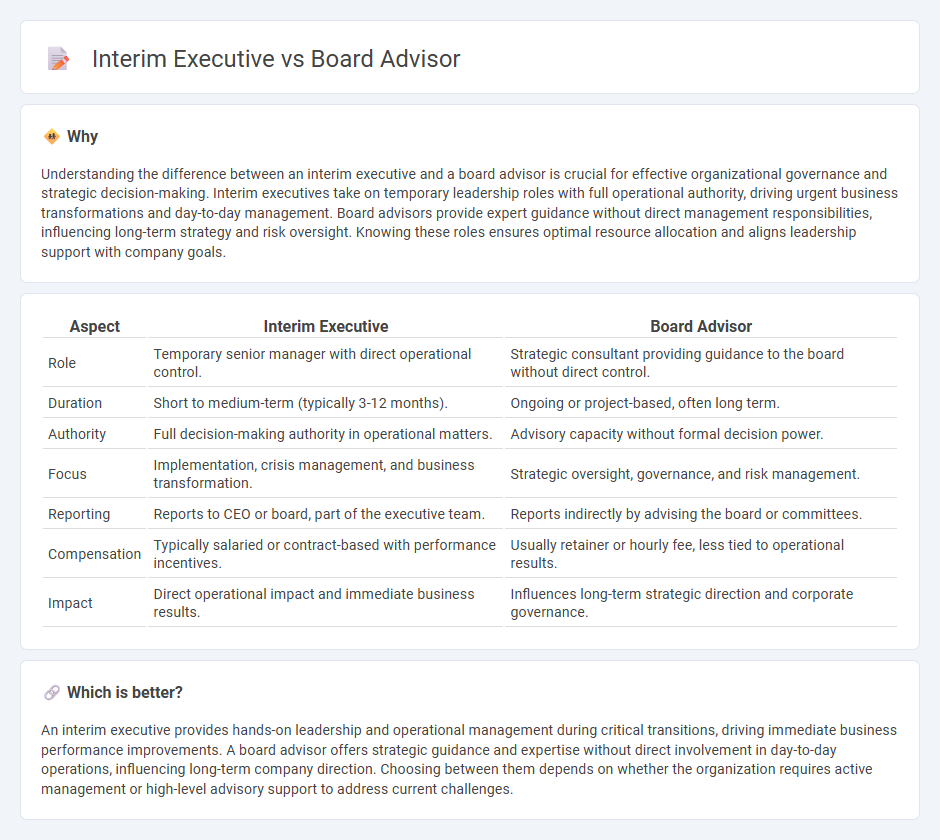
Interim executives provide hands-on leadership and operational management during transitional periods, ensuring business continuity and driving strategic initiatives. Board advisors offer expert guidance and governance insights without direct management responsibilities, enhancing decision-making at the board level. Explore the distinct roles and benefits of interim executives versus board advisors to optimize your organization's leadership strategy.
Why it is important
Understanding the difference between an interim executive and a board advisor is crucial for effective organizational governance and strategic decision-making. Interim executives take on temporary leadership roles with full operational authority, driving urgent business transformations and day-to-day management. Board advisors provide expert guidance without direct management responsibilities, influencing long-term strategy and risk oversight. Knowing these roles ensures optimal resource allocation and aligns leadership support with company goals.
Comparison Table
| Aspect | Interim Executive | Board Advisor |
|---|---|---|
| Role | Temporary senior manager with direct operational control. | Strategic consultant providing guidance to the board without direct control. |
| Duration | Short to medium-term (typically 3-12 months). | Ongoing or project-based, often long term. |
| Authority | Full decision-making authority in operational matters. | Advisory capacity without formal decision power. |
| Focus | Implementation, crisis management, and business transformation. | Strategic oversight, governance, and risk management. |
| Reporting | Reports to CEO or board, part of the executive team. | Reports indirectly by advising the board or committees. |
| Compensation | Typically salaried or contract-based with performance incentives. | Usually retainer or hourly fee, less tied to operational results. |
| Impact | Direct operational impact and immediate business results. | Influences long-term strategic direction and corporate governance. |
Which is better?
An interim executive provides hands-on leadership and operational management during critical transitions, driving immediate business performance improvements. A board advisor offers strategic guidance and expertise without direct involvement in day-to-day operations, influencing long-term company direction. Choosing between them depends on whether the organization requires active management or high-level advisory support to address current challenges.
Connection
Interim executives and board advisors share a strategic connection by providing specialized leadership and governance expertise during transitional periods in a company. Both roles focus on enhancing organizational performance through informed decision-making, risk management, and alignment with corporate goals. Their collaboration ensures continuity, strengthens leadership capacity, and supports successful change management initiatives.
Key Terms
**Board Advisor:**
Board advisors provide strategic guidance and expert insights without daily operational responsibilities, often leveraging industry-specific knowledge to influence high-level decision-making. They typically engage periodically, offering governance support, risk assessment, and long-term planning expertise that aligns with the company's vision. Explore how Board Advisors can drive sustainable growth and enhance your leadership strategy.
Governance
Board advisors provide strategic guidance and governance oversight without direct operational responsibilities, ensuring alignment with long-term organizational goals. Interim executives assume temporary leadership roles with hands-on decision-making authority to maintain business continuity during transitions. Explore the distinct governance roles and benefits each position offers for effective organizational leadership.
Oversight
Board advisors provide strategic guidance and oversight without direct involvement in daily operations, ensuring long-term governance and compliance. Interim executives take on temporary leadership roles, managing day-to-day activities while implementing critical operational changes. Explore more to understand which role best supports your organization's oversight needs.
Source and External Links
Board Advisor Role - Explains the role of a board advisor, including strategic advice, industry insights, and leadership development.
Board Advisor Role - Describes a board advisor as an external expert providing strategic guidance without formal board membership.
The Role of an Advisor to the Board - Highlights the responsibilities and benefits of board advisors in enhancing governance and strategy.
 dowidth.com
dowidth.com